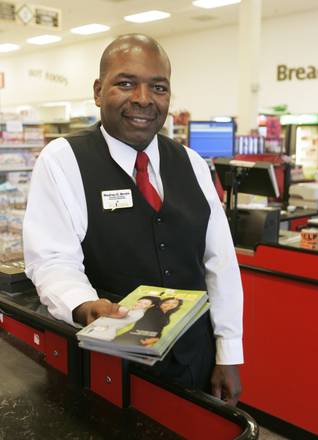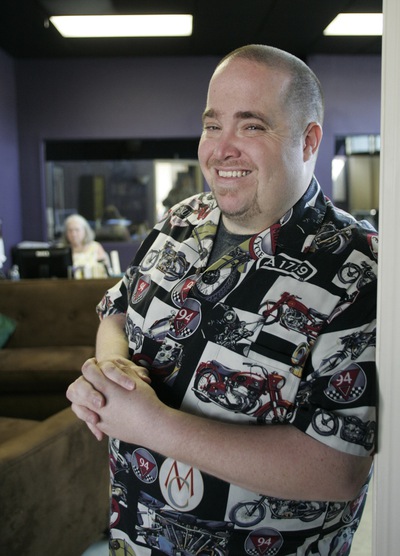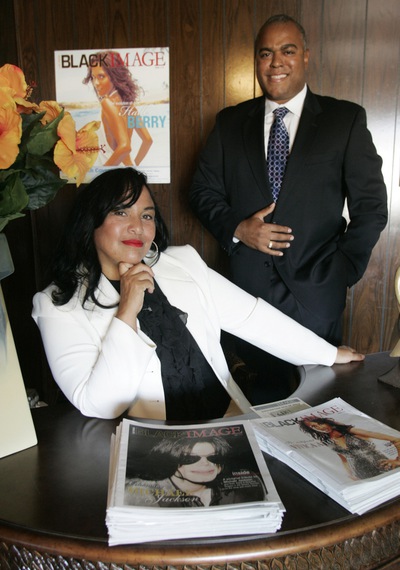
Rodney Smith was one of three people who launched Urban Voice about a year ago, but has since gone out on his own to publish Our Own Voices.
Saturday, Sept. 19, 2009 | 2 a.m.
Beyond the Sun
In a first for the Las Vegas Valley, three local magazines focusing on blacks are now available to readers.
They have in common monthly publication, an abiding editorial interest in “positive” news, free distribution and inspiration from Barack Obama’s presidency.
Their differences also highlight some of the key issues in the post-civil-rights-era discussion about blacks in America: ownership, class and image.
The most recent entry, Our Own Voices, published its first issue last month. The Urban Voice and Las Vegas Black Image have launched in the past year.
Charles Tureaud could have been speaking for all three when he said his venture with Las Vegas Black Image came out of seeing a “void,” a need to tell stories that weren’t being told. Tureaud is half of the husband-wife team that shares the publishing duties of his magazine with the Las Vegas Review-Journal.
Mark Ludwig, associate professor in the communication studies department of California State University, Sacramento, said magazines and newspapers covering minority communities have historically filled a gap.
“General interest news publications tend to underserve minority populations,” said Ludwig, who has studied the effect of black publications on political participation in the black community. A recent study by New America Media, a California-based organization, estimates the nationwide audience for minority publications at 57 million.
For Rodney Smith, Our Own Voices is actually a second attempt at serving his community. He was one of three people who launched the Urban Voice in September 2008, along with Joseph Abraham, who is now publisher of the latter — and is white. Smith said he decided to go his own way because he thought the valley needed a publication that was solely in the hands of a black man or woman.
“No one sees things from the eyes of a people belonging to a certain cultural group like someone from that group,” Smith said.
Abraham said he “didn’t see it (the publisher’s race) as an issue, if we have a quality product that meets the needs of the African-American community.” He, like Smith, tends to consider that “community” as centered in the area known as West Las Vegas, a destination for blacks since before the Las Vegas Strip was desegregated in the 1960s, and an area that has suffered with poverty and crime. The August issue of The Urban Voice includes stories on the possible closure of a post office on Martin Luther King Boulevard and on the Las Vegas-Clark County Urban League, for example.
Kimberly Bailey-Tureaud, of Las Vegas Black Image, said publishing with a larger newspaper is a “strategic alliance” allowing her to “reach a broader audience,” meaning not just blacks. Similarly, her magazine’s subject matter isn’t confined to one geographic area. After all, “African-Americans live all over” the valley, she said. There are about 178,000 blacks in the valley, 9.7 percent of the population, according to 2007 Census Bureau estimates.
Las Vegas Black Image mines that community for profiles or interviews with professionals such as doctors, lawyers and architects, “to showcase a positive image” of black men and women. The magazine features entertainers on the cover to “hook” readers, Tureaud added.
Abraham and Smith hope to build connections to the communities they cover in a way larger publications cannot. “I can sit down and have lunch with readers,” Smith said. Similarly, Abraham highlighted the fact of his magazine’s office being located in West Las Vegas.
All three magazines have come to life in part because of Barack Obama, their owners said. Smith said he set off on his own after thinking about an Obama speech that included the phrase, “We are the ones we’ve been waiting for.”
“I thought, ‘Why wait?’ ” Smith said.
Abraham saw the 2008 campaign and election as an opportunity. “It was like, ‘This is our chance.’ We have a lot African-Americans with similar political ideologies who are engaged and serious about helping the community.”
The coming months will tell whether the three magazines can survive the recession. Smith sees crisis as opportunity. “News happens whether in a recession or not,” he said.
“People are hungry now for information and larger publications may not always give information to this smaller group of people.”



Join the Discussion:
Check this out for a full explanation of our conversion to the LiveFyre commenting system and instructions on how to sign up for an account.
Full comments policy